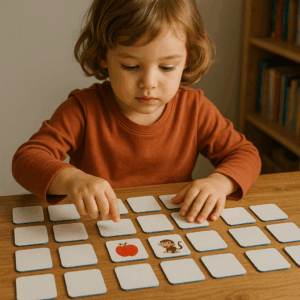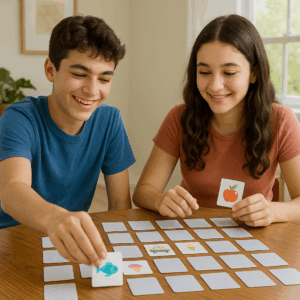Matching games have captivated players of all ages for generations, offering a blend of entertainment and cognitive challenge. These games typically involve pairing items, whether they be cards, images, or sounds, based on shared characteristics or themes. The simplicity of the concept belies the depth of engagement they can provide.
From classic card-matching games like Concentration to modern digital adaptations, the essence of matching games remains rooted in the fundamental human desire for connection and recognition. As technology has evolved, so too have the formats and platforms for these games, allowing for a more immersive experience that can be enjoyed solo or with others. The appeal of matching games lies not only in their straightforward mechanics but also in their ability to stimulate mental processes.
Players must engage their memory, attention, and strategic thinking as they navigate through various levels of difficulty. This cognitive engagement is what makes matching games not just a pastime but also a valuable tool for mental development. As we delve deeper into the world of matching games, we will explore their benefits across different age groups, the variety of formats available, and the social dynamics they can foster.
Benefits of Playing Matching Games
Engaging in matching games offers a plethora of cognitive benefits that extend beyond mere entertainment. One of the most significant advantages is the enhancement of memory skills. Players are often required to remember the locations of various items or the characteristics that link them together.
This process of recalling information strengthens neural pathways associated with memory retention. Research has shown that regular engagement in memory-based activities can lead to improved recall abilities in everyday life, making matching games an excellent exercise for the brain. In addition to memory enhancement, matching games also promote critical thinking and problem-solving skills.
As players progress through different levels or face increasingly complex challenges, they must develop strategies to succeed. This might involve analyzing patterns, predicting outcomes, or making quick decisions under pressure. Such skills are transferable to real-world situations, where strategic thinking and adaptability are essential.
Furthermore, the competitive aspect of many matching games can foster a sense of achievement and motivation, encouraging players to set and reach personal goals.
Matching Games for Kids
 Matching games are particularly beneficial for children, serving as both educational tools and sources of entertainment. Many early childhood educators incorporate matching games into their curricula to help young learners develop essential skills such as pattern recognition, vocabulary acquisition, and social interaction. For instance, games that involve matching letters with corresponding images can enhance literacy skills while making learning enjoyable.
Matching games are particularly beneficial for children, serving as both educational tools and sources of entertainment. Many early childhood educators incorporate matching games into their curricula to help young learners develop essential skills such as pattern recognition, vocabulary acquisition, and social interaction. For instance, games that involve matching letters with corresponding images can enhance literacy skills while making learning enjoyable.
The tactile nature of physical matching games, such as card sets featuring animals or shapes, allows children to engage with the material in a hands-on manner, reinforcing their understanding through play. Digital matching games have also gained popularity among children, with numerous apps designed specifically for young audiences. These games often feature vibrant graphics and engaging storylines that capture children’s attention while providing educational content.
For example, a game might require players to match fruits with their corresponding colors or shapes, reinforcing both color recognition and categorization skills. Moreover, many digital platforms allow for customization and progression tracking, enabling parents and educators to monitor a child’s development over time.
Of course, all games here on bouncing-memory.at can also be played by children! But here we have selected just a few to make the selection easier.
Matching Games For Kids
Matching Games for Teens
As children grow into their teenage years, their interests and cognitive abilities evolve, leading to a demand for more complex matching games that challenge their developing minds. Teen-oriented matching games often incorporate elements of strategy and competition, appealing to their desire for social interaction and engagement with peers. Games that require players to match characters or items based on intricate storylines or themes can captivate teenagers while encouraging critical thinking and collaboration.
Moreover, many teens are drawn to online multiplayer matching games that allow them to connect with friends or compete against others globally. These platforms often feature leaderboards and achievements that foster a sense of community and friendly rivalry. For instance, popular mobile games like “Candy Crush Saga” or “Bejeweled” not only challenge players’ matching skills but also integrate social features that enable sharing progress and competing with friends.
This social aspect is crucial during adolescence when peer relationships play a significant role in personal development.
With our sound memory games, it’s never boring. Animals, monsters, bells, or spooky ghosts—the choice is endless.
Matching Games for Adults
While matching games are often associated with children and teens, they hold significant appeal for adults as well. Many adults turn to matching games as a form of relaxation and stress relief after a long day. The repetitive nature of matching can be meditative, allowing players to unwind while still engaging their minds.
Furthermore, adult-oriented matching games often incorporate themes that resonate with older audiences, such as historical events, art, or even popular culture references. In addition to providing entertainment, matching games for adults can also serve as cognitive training tools. Studies have indicated that engaging in brain-training activities can help maintain cognitive function as individuals age.
Games designed specifically for adults may include more complex rules or time constraints that challenge players’ mental agility and problem-solving abilities. For example, some apps offer daily challenges that require quick thinking and strategic planning, making them an excellent choice for those looking to keep their minds sharp.
Tips for Playing Matching Games
To maximize enjoyment and success in matching games, players can employ several strategies that enhance their gameplay experience. One effective approach is to develop a systematic method for remembering item locations or characteristics. For instance, players can create mental associations between items or use mnemonic devices to aid recall.
This technique not only improves performance but also makes the game more engaging as players actively participate in their cognitive development. Another valuable tip is to practice patience and focus during gameplay. Many matching games require quick thinking and rapid decision-making; however, taking a moment to assess the board before making a move can lead to better outcomes.
Players should also be mindful of patterns that emerge during gameplay—recognizing these patterns can provide insights into potential matches and strategies for future moves. Lastly, embracing the social aspect of multiplayer matching games can enhance enjoyment; collaborating with friends or engaging in friendly competition can create memorable experiences that extend beyond the game itself.
The Future of Matching Games Online
As technology continues to advance, the future of matching games online appears bright and full of potential. The integration of augmented reality (AR) and virtual reality (VR) technologies could revolutionize how players interact with these games, creating immersive environments where physical and digital elements blend seamlessly. Imagine stepping into a virtual world where players can physically reach out to match items in a 3D space—this level of engagement could redefine the genre entirely.
Moreover, advancements in artificial intelligence (AI) may lead to more personalized gaming experiences tailored to individual player preferences and skill levels. AI-driven algorithms could analyze gameplay patterns and suggest challenges that align with a player’s strengths while pushing them to improve in areas where they may struggle. This level of customization could enhance player satisfaction and retention rates significantly.
In conclusion, matching games have evolved from simple card-based activities into multifaceted experiences that cater to diverse audiences across various platforms. Their ability to engage players cognitively while fostering social connections ensures their continued relevance in an ever-changing digital landscape. As we look ahead, it is clear that matching games will remain a beloved pastime for generations to come, adapting and innovating along the way.

